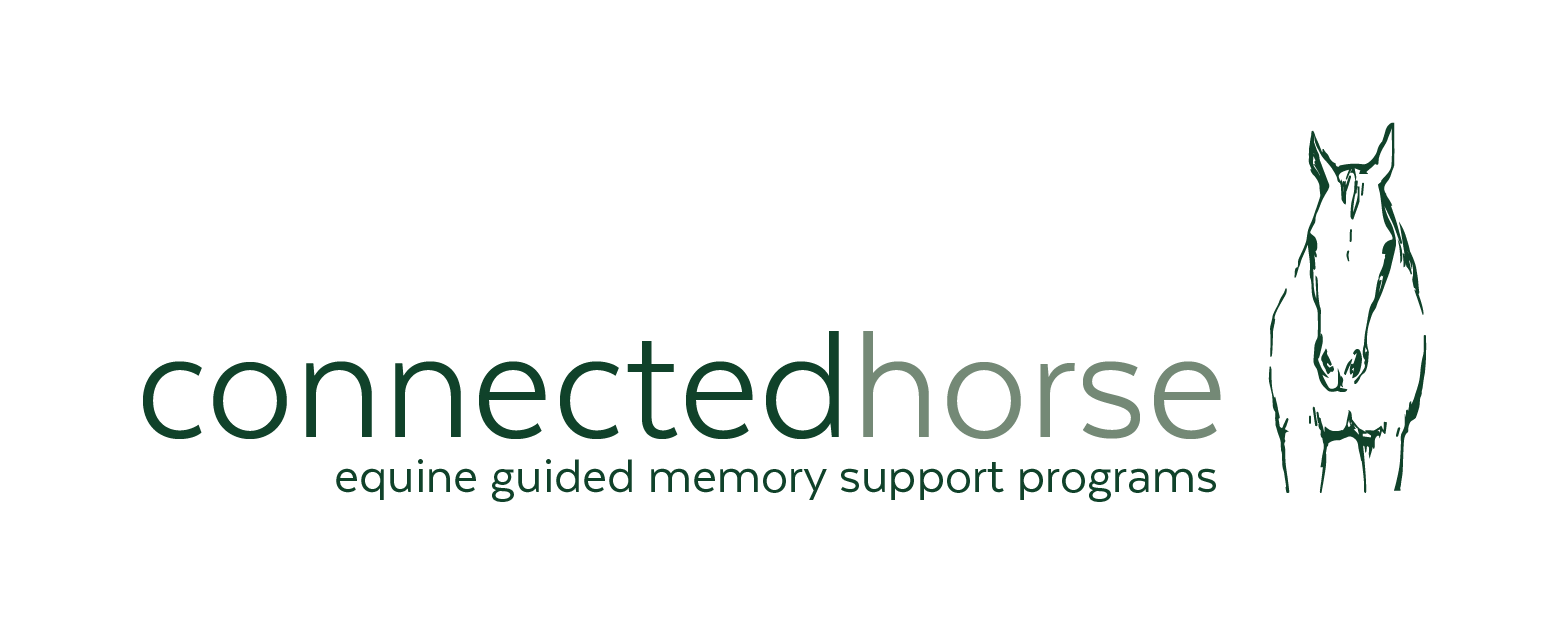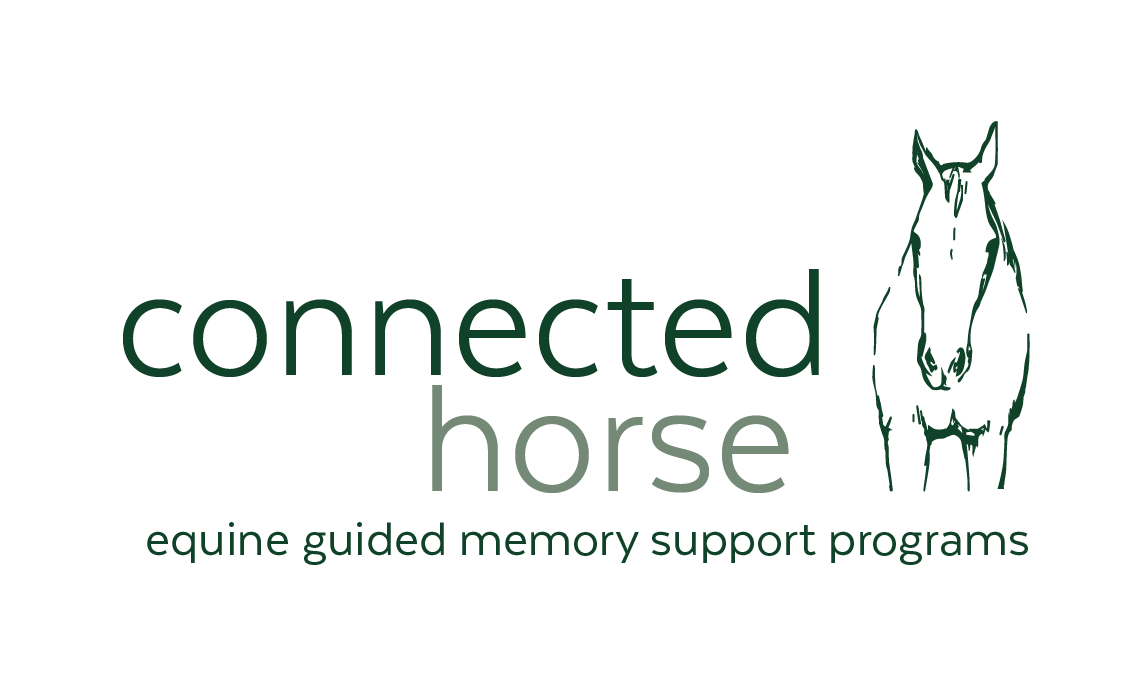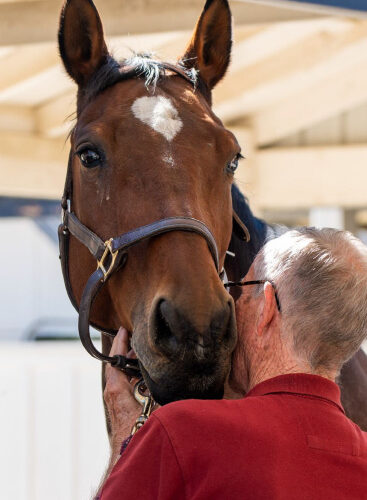Six Reasons Why Horses Are Central to Our Work
By Paula Hertel and Nancy Schier-Anzelmo
Connected Horse just celebrated its 8th anniversary! We launched this nonprofit program out of passion, based on our shared professional backgrounds in aging services and a lifelong love of horses. We offer individuals living with memory changes and dementia and their care partners free workshops funded by our generous donors. Today hundreds of participants have gone through the program, reporting a host of positive benefits—from less stress and anxiety to greater connection and sense of purpose.
One of the questions we hear the most is, “Why Horses?” What is it about the horse that deepens the relationships between individuals living with dementia and their care partners?
One.
Horses evoke memories.
Horses are an integral part of our human history. Connected Horse workshops often trigger us to think about the relationship with horses throughout history, and throughout our lives. At the start of our workshops, we always ask the question: “What do you think about when you think about a horse?”
Almost every participant has a story about a relationship with a horse that brings back memories—feeding a pony an apple at a young age, , falling off of a horse while galloping along a trail, riding a mule down the Grand Canyon, watching horses at the racetrack, or spending time on a ranch with family. What is your memory of a horse?
Two.
Horses are prey animals.
Horses are sensitive prey animals who rely on their fellow herd members for their safety and survival, and like us, need relationships. Prey animals are good for therapeutic work because they’re highly sensitive to human emotions, body language, and intentions. They can pick up on subtle cues.
Because horses are so sensitive to their environment, they provide immediate feedback to the participants. Are you trustworthy? Are you safe? Participants see how a horse responds to them and how horses interact with each other and their environment. If someone is anxious or tense, the horse may respond accordingly, allowing participants to observe and become more aware of behavioral patterns. If you are nervous and the horse picks up on that nervousness, somewhere in the back of their brain, they react to something that they should be concerned about, and they start to reflect back that nervousness to you. Conversely, if you approach a horse with calm curiosity, the horse responds in kind, drops their head, and relaxes.
At Connected Horse, participants experience the horses individually and observe the horses in a herd. During our workshops, the horses will act as a mirror, allowing participants to play around with self-regulation and emotional awareness. They can see how they can impact the world around them and how their interactions create a response in the environment. Horses are great teachers.
Three.
Horses build trust and confidence.
Interacting with horses and the group helps to build trust and confidence. Connected Horse participants regularly say “I’ve never felt so accepted. I’ve never felt so supported.”
The sheer physicality of a horse has participants take pause. We love watching the negotiation of mutual respect and leadership unfold when leading a 1200-pound horse. They don’t need words to communicate. They can really be in a relationship with each other and decide where they want to go. It is powerful.
When we survey participants, an increased sense of confidence is one of the top three benefits they report when sharing the experience of the workshops. In the process of horses trusting humans and humans trusting horses, there is magic. Developing a bond with a horse requires trust and communication that builds confidence, improves communication skills, and develops a sense of responsibility and self-agency.
Four.
Horses encourage us to be mindful and present.
Working with horses requires participants to be present in the moment, fostering mindfulness. During our workshops, it’s the care partner who often takes the role of “I have to get this done,” and will approach the horse abruptly or with a task to complete, like trying to force lifting up the hoof. The horse thinks, “this doesn’t feel good to me. I’m not in relationship with you,” and they won’t lift their hoof.
Care partners and individuals living with dementia are able to step outside of their comfort zones and shed polarized roles as givers and takers. No role is required. There are the horses and each other, with new experiences flowing out of the interactions. Everyone in the program gets to reimagine themselves as a whole person, not just as the role or label that has been placed on them.
We rely too much on the spoken word. As people progress with dementia diagnosis, they can lose their verbal skills, called aphasia, caused by damage to the part of the brain that controls language. Learning how to be in a relationship, in negotiation, and mutual respect with the horse, Connected Horse participants learn how to build a relationship and communicate without words.
Five.
Horses get us out in nature.
Natural settings can be a powerful mood-booster. Being in a natural environment has multiple positive effects on well-being. There is a whole sensory experience of new sounds and smells, the breeze coming up in the leaves and the horses nickering in the background—all of these sensory experiences get us out of our heads and into our senses, and that’s where feelings of peace, awareness, compassion, and understanding come from.
Just being in nature provides a peaceful and calming environment that can help reduce the physiological and psychological effects of stress. Spending time in nature has been linked to decreased cortisol levels, the hormone associated with stress. We see improved moods, increased creativity, and more innovative problem-solving skills. This is often attributed to the restorative effect that nature has on the brain, allowing for improved cognitive function and a “fresh perspective.” Studies have shown that spending time in green spaces or even just looking at natural scenes can enhance attention and cognitive function.
Six.
Horses are great equalizers.
Horses are the great equalizers. Horses don’t judge us by what diseases we have or the roles that society has placed on us. They are nonjudgmental sentient beings. Horses deserve to have an expanded role in our society. Therapeutic opportunities, like Connected Horse, allow horses, especially retired horses, to have a new purpose while providing a nonpharmaceutical benefit to older adults. Connected Horse allows the human and horse interaction to unfold organically. The lasting positive outcomes for the individuals living with dementia and their care partners have been validated by our research partners from Stanford University and UC Davis.
Our underserved populations need support more than ever. Over 6 million Americans aged 65 and older are living with Alzheimer’s disease, the most prominent type of dementia. Projections indicate that by 2050, the number could reach 13.8 million. Family members and friends often serve as primary caregivers for individuals living with dementia. More than 53 million unpaid caregivers in the United States face challenges related to emotional and physical well-being, financial strain, and balancing caregiving with other responsibilities. Connected Horse’s mission encompasses being available throughout the country and helping people stay engaged in relationships and their everyday lives.



